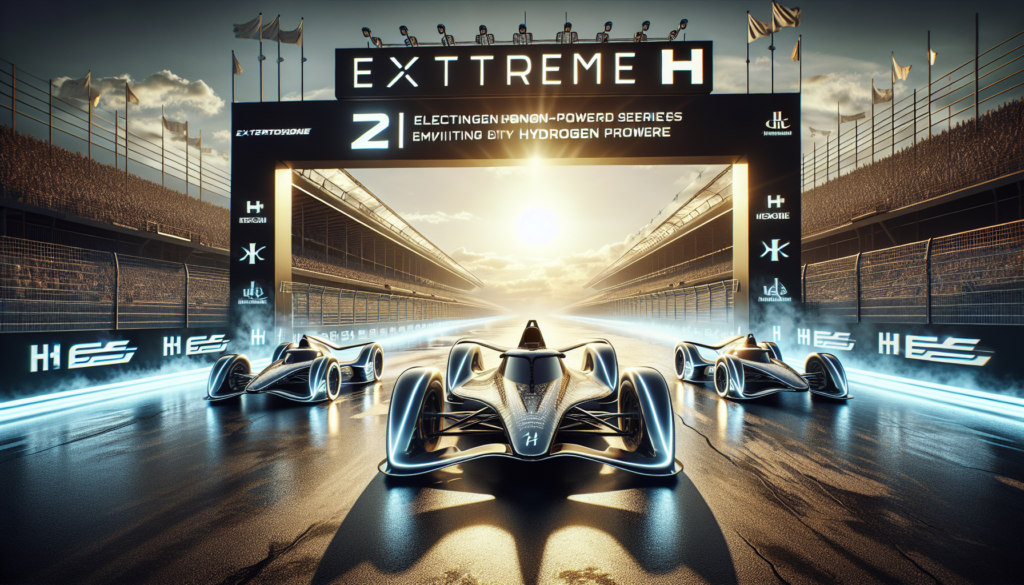
 ## Extreme E Rebrands to Extreme H, Unveiling Hydrogen-Powered Racing Series in 2025
## Extreme E Rebrands to Extreme H, Unveiling Hydrogen-Powered Racing Series in 2025
The realm of motorsports is on the cusp of a groundbreaking change as Extreme E transitions to Extreme H, emphasizing its dedication to sustainability and technological advancement. Launching in 2025, this hydrogen-powered racing series is set to revolutionize racing by merging high-speed thrills with eco-friendly technology.
From Extreme E to Extreme H: A Natural Progression
Extreme E has always championed electric vehicle racing, but the move to hydrogen power marks a notable advancement. Hydrogen fuel cells present a cleaner alternative to both fossil fuels and electric batteries, releasing only water vapor as a byproduct. This shift is in line with global initiatives to lower carbon footprints and mitigate climate change.
The Case for Hydrogen
Hydrogen is plentiful and can be generated using renewable energy sources such as wind and solar power. It has a higher energy density compared to batteries, allowing for longer race durations and fewer refueling stops. This renders it an optimal choice for the high-energy demands of racing.
Innovations in Hydrogen-Powered Racing Technology
Transitioning to hydrogen-powered vehicles will drive numerous technological breakthroughs, affecting not only the cars but also the entire support ecosystem around the sport.
Fuel Cell Advancements
Central to these hydrogen-powered vehicles is cutting-edge fuel cell technology. These cells convert hydrogen into electricity to power the motors. The efficiency and dependability of these fuel cells are vital for vehicle performance and safety.
Development of Infrastructure
Supporting hydrogen-powered racing necessitates considerable investments in infrastructure, such as hydrogen production plants, refueling stations, and safety protocols for handling the flammable gas.
Environmental Advantages
A key motivator for the switch to hydrogen is its minimal environmental footprint. Unlike conventional racing fuels, hydrogen does not lead to harmful emissions, positioning Extreme H as a leader in sustainable motorsport.
Striving for Carbon Neutrality
Extreme H aims for carbon neutrality by offsetting emissions resulting from manufacturing and transportation. This comprehensive strategy ensures the entire lifecycle of the vehicles remains eco-friendly.
Shaping the Future of Motorsports
The introduction of Extreme H is anticipated to establish a new benchmark in motorsports, attracting eco-conscious audiences and encouraging other racing leagues to embrace sustainable practices.
Engaging Fans
With heightened awareness of climate change, fans are increasingly drawn to sports aligning with their values. Extreme H provides a thrilling platform for fans to enjoy high-speed racing while backing environmental sustainability.
Conclusion
Extreme H is set to transform motorsports with its hydrogen-powered racing series. Blending state-of-the-art technology with a dedication to sustainability, it offers a forward-looking vision of racing. As we advance towards a greener world, Extreme H emerges as a symbol of innovation and ecological responsibility.
Q&A Session
Q1: Why are hydrogen fuel cells considered more sustainable compared to electric batteries?
A1: Hydrogen fuel cells generate only water vapor as a byproduct, making them more environmentally friendly than electric batteries, which necessitate the mining of rare earth metals and generate waste.
Q2: How will Extreme H ensure the safety of hydrogen-powered vehicles?
A2: Extreme H will enforce rigorous safety measures, including secure refueling stations and advanced safety features in the vehicles to manage hydrogen’s flammability.
Q3: Will there be adequate infrastructure to support hydrogen-powered racing?
A3: Yes, substantial investments are being made in hydrogen production and refueling infrastructure to ensure efficient race operations.
Q4: How does hydrogen fuel’s performance compare with traditional racing fuels?
A4: Hydrogen fuel has a higher energy density, which allows for longer races and fewer pit stops, making it highly competitive with traditional fuels.
Q5: What measures is Extreme H taking to achieve carbon neutrality?
A5: Extreme H will offset emissions from manufacturing and transportation, ensuring the entire lifecycle of their vehicles is environmentally sustainable.
Q6: How will Extreme H attract eco-conscious fans?
A6: Extreme H will highlight its commitment to sustainability to draw fans dedicated to environmental causes, offering them an exciting yet responsible racing experience.
For further details on wireless earbuds with extended battery life, the best Bluetooth speakers for 2024, or Apple AirPods, visit Lonelybrand.com.